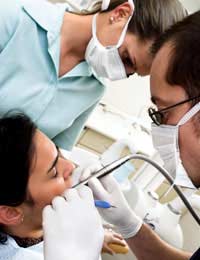Periodontal Disease

Periodontal disease is the name give to serious oral infections, which, if left untreated, can destroy tissue in the gums and cause loss of jaw bone. The ultimate outcome of periodontal disease will be tooth loss, although the disease can spread throughout the body and contribute to other serious medical conditions.
Causes of Periodontal Disease
Periodontal disease is caused by bacteria in the mouth that has not been brushed away properly and has formed into plaque. Plaque can harden to such a degree that only a dentist will be able to remove it. If plaque is allowed to stay on the teeth, then an inflammation of the gums will occur; this is an early symptom of the disease. This early stage is called gingivitis, and if this is not treated the outcome will be periodontitis; the gums will recede from the teeth, allowing bacteria to flood the open pockets.The body’s immune system will then kick in to combat the toxins and bacteria that are attacking your teeth below the gum line. Ironically, the immune system’s enzymes that are fighting the infection will also eradicate the bone and tissue holding the teeth in place. If this is not treated immediately the result will be loss of bone, tissue and gums. The final outcome will be tooth loss.
Symptoms of Periodontal Disease
There are millions of people worldwide who are unaware that they have some form of periodontal disease. This is one of the reasons that the bi-annual dental visits are so important. Only a dentist, or periodontist, will be able to detect the early symptoms of the disease. Gum disease will usually occur around the ages of 30 to 40, and the disease is more common in men than in women. There are a few signs that should ring alarm bells, although symptoms will vary in each individual.- Continual bad breath, even after brushing and flossing
- Swollen, tender or bleeding gums
- Gums that recede from the teeth
- Teeth that are sensitive to high or low temperatures
- Loose teeth
Treatment of Periodontal Disease
The treatment of the disease will depend on how far along the disease has progressed and the damage that has already been caused by the disease.Treatments will include:-
Deep cleaning, consisting of scaling and root planing in order to remove the infection below the gum line. This will eradicate all bacteria and make it harder for bacteria to attach itself to the treated root.
Medications can also be used to either eliminate the bacteria completely, or as a preventative measure in boosting the body’s immune system in order to fight the infection.
Surgery can also be performed by a periodontist; this will consist of pulling back the gum flaps, removing the tartar and then stitching back the gums. Bone and tissue grafts may also be required depending on the extent of the damage to the jaw bone and connective tissue.
Increased Risk of Periodontal Disease
There are some people who are more susceptible to the disease than others. These will include smokers, anyone with an illness that compromises their immune system, people who suffer from diabetes, and people who use a lot of medication. Studies have also shown that stress has been linked with periodontal disease. There is also a risk of the infection passing through saliva to other members of the family, and some people are simply more genetically susceptible to the disease than others.Medical Complications
Periodontal disease has been linked to other medical conditions such as an increased risk of heart attacks, irregular blood sugar levels in diabetics, and premature births.Periodontal disease is one of the most serious infections that can occur to the gums and teeth. However it is a treatable and preventable condition. Regular dental visits combined with daily at home dental care will dramatically cut any risk of the disease occurring.
- Patient Safety and Decontamination
- Dental Holidays: Travelling Abroad for Dental Work
- Orthodontic Tooth Straightening Treatments
- Treatments for Bad Breath
- At Home Dental Whitening
- Treatments for Headaches and Facial Pain
- Micro Dentistry
- Tooth Contouring
- Crowns
- Dentures
- Root Canal Therapy
- Dental Implants
- Wisdom Teeth Extraction
- Dental Emergencies
- How Dental Bridges Work


Re: Dental Repairs - What is the General Expiry?
I am looking for re root canal treatment with ozone therapy, but unable to find one in the Cambridgeshire…
Re: Ozone Dental Therapy
Any good dentist that offer ozone therapy preferably in the west midlands or surrounding areas?
Re: Ozone Dental Therapy
Hello Andie I had this problem with my gums I had deep pockets . Brehens practice has be been a God sent , they do laser and do ask for…
Re: Ozone Dental Therapy
Hi I am looking for an Ozone dentist in the Newcastle upon Tyne area if anyone can help?
Re: Ozone Dental Therapy
Hi, I'm looking for a dentist in Cambridge, UK, that uses ozone therapy in their practice, can you help please, as an internet search has…
Re: Ozone Dental Therapy
Hello, how can I find a list of dentists in Surrey and SW London who are offering ideally both NHS dentistry plus Ozone Treatment? Any help…
Re: Ozone Dental Therapy
Lot’s of people asking the same question. Where can you find a dentist using Ozone treatment. Searched online and it seems London and the…
Re: Ozone Dental Therapy
Hello, i have had root canals and also still suffer from advanced periodontal disease Is there a list of dentists in London or Tgere about…
Re: Ozone Dental Therapy
Hi Since i had root canal done has caused me lot of doenside on my health evdn though i look after myself and diet. Recently i have had lump…
Re: Ozone Dental Therapy
Like Ann, I have also read the What Doctors Don't Tell You article on Ozone dental treatment and would like to find a dentist in the London…